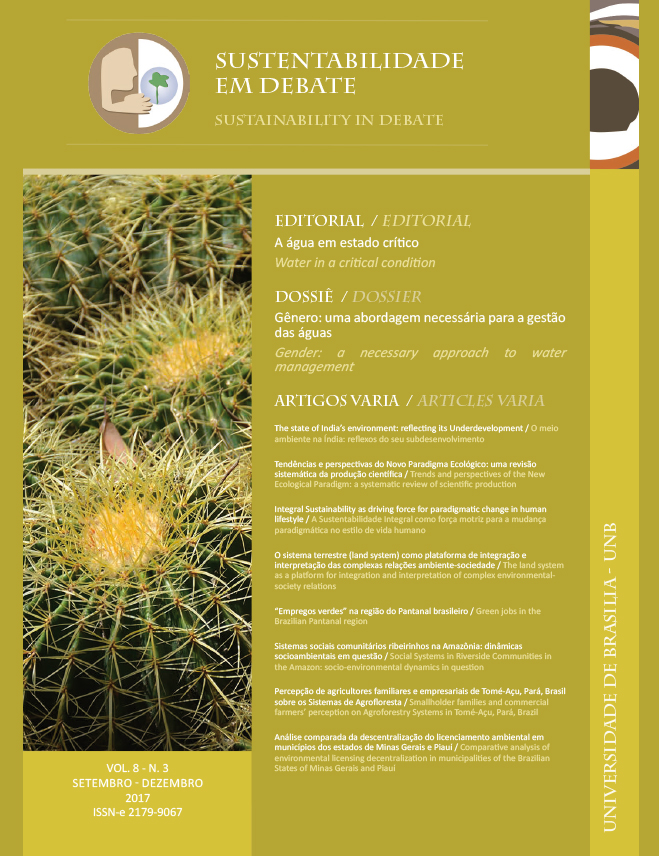Women’s agency in water governance:
lessons from the water and health nexus in Armenia and Ukraine
DOI:
https://doi.org/10.18472/SustDeb.v8n3.2017.26587Abstract
Water security is a global challenge and a collective responsibility for all humanity. The way in which people are affected by or impact on water availability, quality and management is quite heterogeneous; and it has a distinct gender dimension. Social relations between women and men result in gendered roles that vary between social strata, cultures, ethnicities and generations. In traditional societies women are often the water seekers and carriers, while their involvement in decision-making is limited. This article focuses on women’s agency for sustainable use and management of water resources. It provides examples from Armenia and Ukraine demonstrating women’s civil society contributions to the development and implementation of the Protocol on Water and Health. It shows how women’s meaningful participation has made a difference, and sheds light on the preconditions for meaningful involvement of women’s civil society in processes of water cooperation and participatory water governance.
Downloads
References
Economic Commission for Europe/World Health Organisation’s Regional Office for Europe, Protocol on Water and Health to the 1992 Convention on the Protection and Use of Transboundary Watercourses and International Lakes, London, 1999.
Global Water Partnership (GWP). Gender Strategy, 2014. available at: http//www.womenforwater.org.
OHCHR. Realising the human rights to water and sanitation: a handbook, booklet 7: Principles ”“ the right to participation, pages 57 ”“ 72. OHCHR, Geneva, 2014, available at: http://www.ohchr.org/Documents/Issues/Water/Handbook/Book7_Principles.pdf.
UNECE. Gender Action Plan: Key to Regional Sustainable Development http://www.unece.org/fileadmin/DAM/Gender/publication/ECE_GAP_Framework_website1.pdf.
UNICEF: Gender and Water, Sanitation and Hygiene (WASH), 2010, available at: http://www.unicef.org/esaro/7310_Gender_and_WASH.html.
UN Women. The World Survey on the Role of Women in Development: Gender Equality and Sustainable Development, New York, 2014, Chapter 6, available at: http://www.unwomen.org/~/media/headquarters/attachments/sections/library/publications/2014/unwomen_surveyreport_advance_16oct.pdf.
UNITED NATIONS. UNGA Resolution 58/217: International Decade for Action “Water for Life” 2005-2015 (A/RES/58/217), December 2003, available at: http://www.un.org/es/comun/ docs/?symbol=A/RES/58/217&lang=E.
UNITED NATIONS. The Dublin Statement on Water and Sustainable Development, Dublin, Ireland, 1992, available at: http://www.un-documents.net/h2o-dub.htm.
UNWomen, A transformative stand-alone goal on achieving gender equality, women’s rights and women’s empowerment: imperatives and key components, New York, 2013, available at: http://www.unwomen.org/en/digital-library/publications/2013/7/post-2015-long-paper#view.
United Nations. Conference on Environment and Development (UNCED), Agenda 21 ”“ Part I - Chapter 18 - Protection of the Quality and Supply of Freshwater Resources: Application of Integrated Approaches to the Development, Management and Use of Water Resources. Rio de Janeiro, 1992.
Women for Water Partenership (WfWP, 2013). Report on Dushanbe Gender Forum to the High Level International Conference on Water Cooperation, 2013, available at: http://www.womenforwater.org.
Downloads
Published
How to Cite
Issue
Section
License
SUSTAINABILITY IN DEBATE – Copyright Statement
The submission of original scientific work(s) by the authors, as the copyright holders of the text(s) sent to the journal, under the terms of Law 9.610/98, implies in the concession of copyrights of printed and/or digital publication to the Sustainability in Debate Journal of the article(s) approved for publication purposes, in a single issue of the journal. Furthermore, approved scientific work(s) will be released without any charge, or any kind of copyright reimbursement, through the journal’s website, for reading, printing and/or downloading of the text file, from the date of acceptance for publication purposes. Therefore, the authors, when submitting the article (s) to the journal, and gratuitous assignment of copyrights related to the submitted scientific work, are fully aware that they will not be remunerated for the publication of the article(s) in the journal.
The Sustainability in Debate Journal is licensed under Creative Commons License – Non-Commercial-No-Derivation Attribution (Derivative Work Ban) 3.0 Brazil, aiming at dissemination of scientific knowledge, as indicated on the journal's website, which allows the text to be shared, and be recognized in regards to its authorship and original publication in this journal.
Authors are allowed to sign additional contracts separately, for non-exclusive distribution of the works published in the Sustainability in Debate Journal (for example, in a book chapter), provided that it is expressed the texts were originally published in this journal. Authors are allowed and encouraged to publish and distribute their text online, following publication in Sustainability in Debate (e.g. in institutional repositories or their personal pages). The authors expressly agree to the terms of this Copyright Statement, which will be applied following the submission and publishing by this journal.






